How To Clean A Dog's Teeth
Having clean teeth and healthy gums is as important for dogs as it is for us, yet this aspect of a dogs health care is so often over looked. With just a small amount of effort you can make sure that your dog’s teeth stay in tip top condition.
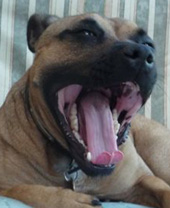
A frighteningly high percentage of pets are in urgent need of dental treatment. This means that they are walking around with infection and inflammation in their mouths. This infection can spread to affect the whole body including the heart, kidneys and liver.
Most dental disease is treatable and certainly the vast majority of dental disease is preventable.
Spotting Dental Issues
As most of us know, tooth ache can be painful and really get us down. Would you know if your dog was suffering? There are some signs you can look for such as the dog seeming quiet or withdrawn and maybe going off their food, eating slowly or showing some reluctance to chew. These are only general signs of pain. Oral disease can be very hard to spot if you don't pay sufficient attention to your dog's dental care. Pet Smile Month point out that often it is only when we see an improvement or change in behaviour after effective dental treatment that we realise that our pet may have been suffering.
“Often dogs and cats can be thought of as “getting older” when in fact the reason why they are more lethargic is down to the effects of dental disease. The phrase “He’s like a puppy or kitten again” is frequently heard from clients returning a week after proper dental treatment has been carried out. This can be the clearest indication of just how much the dental disease has been affecting a pet’s health.”
Oral Health Check
It is good to get into the habit of regularly checking your dog’s mouth, teeth and gums, in the same way that you would regularly groom them and check other parts of their body, skin and coat. The gums and mouth tissues should look pink and healthy (not red or inflamed) and should not easily bleed or show any swellings or signs of pus or discharge. The dog’s breath should not be rancid and all teeth should be firm in the jaw rather than loose. Also check for any fractured or chipped teeth and for tartar build up. Special solutions can be used to show how much plaque is present even on seemingly clean looking teeth.
Dogs with tartar on their teeth may have to have their teeth professionally descaled. Descaling requires a general anaesthetic. The teeth are then often polished to help prevent future tartar build up.
Fighting Plaque
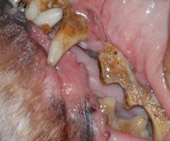
Dental disease often starts with plaque. Any preventive dental care regime should therefore have the combating of plaque at its core.
Chewing is believed be beneficial in helping to reduce dental disease. The action of chewing and the saliva produced can help to remove plaque films from the teeth and rinse the mouth.
Research seems to show less dental disease in pets fed on dry food than those fed on a wet food. This is thought to be because soft foods do not need much chewing. Chewing helps to rub teeth clean and promotes saliva flow, which can help to wash the teeth clean and has an anti-bacterial action.
Brushing your dog's teeth is probably the most important thing you can do to help prevent dental disease. Regular tooth brushing need not be a chore if you accustom your dog to it and make sure it is not a stressful event for you or your pet. The key to effective tooth brushing is to do it regularly, preferably every day.
Dog Toothbrush and Paste
There are so many options available and none need cost a fortune. But please do not use human toothpaste for your dog and select a toothbrush that is right for the size of your dog's mouth and teeth.
You must buy a special dog toothpaste. There are even some tasty pastes available especially for dogs in flavours such as liver which they should enjoy. There are also a variety of dog toothbrushes to choose from including a small but standard looking toothbrush, double headed brushes and even finger brushes, which many dogs accept more readily into their mouths.
Brushing Your Dog's Teeth
First you must get your dog used to having their mouth handled. This is important for the full oral check up as well as for tooth brushing. To check your dog’s oral health and to brush their teeth you need to get the dog accustomed to having their mouth inspected.
You can then start getting your dog accustomed to the sensations and tastes of tooth brushing by putting some dog toothpaste onto your finger. Let your dog smell the paste and practice exposing your dog’s teeth, praising each time. Proceed to rubbing some of the paste in their mouths and onto their teeth with your finger once they are happy with what you are doing so far. Hopefully they will enjoy the taste of the paste and get used to having their mouth handled. Use lots of praise and encouragement.
Once the dog is used to the dog toothpaste and used to being handled in this way, proceed to using paste on the dog toothbrush or finger brush. Don’t try to complete a perfect tooth brushing session straight away. Build up slowly over the coming days as your dog gains confidence.
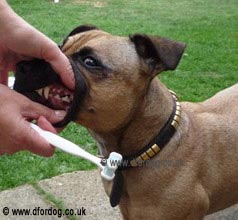 | 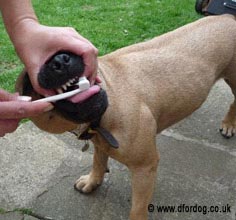 |
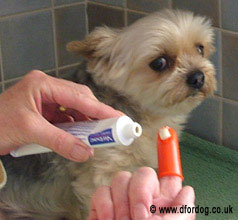 | 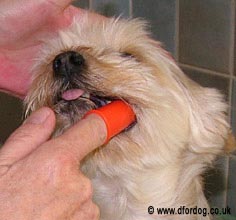 |
Get your dog into a relaxed sitting position. Gently hold your dog's head still and clean the teeth in a back and forth motion over the outside of the teeth, making sure to include all teeth, top and bottom.
Remember to reward your dog with praise during and after tooth brushing.
Regular cleaning of your dog's teeth and a sensible diet will ensure that their teeth and gums stay healthy into old age.
We thought this video was helpful, showing how to clean your dog's teeth and pointing out that once a week is not enough. You need to be committed and do it every day.
By Jenny Prevel
© D for Dog www.dfordog.co.uk
This article belongs strictly to D for Dog and we do not authorise the copying of all or any part of it.

Hi
I dont brush my dog's teeth, he has dry food, and I give him a dental stick morning and night. He doesnt get fed human food. I thought this would be enough.
Might depend on the dry food. The only time my dogs ever had problems was when I used dry food including maize. Their teeth needed far more attention. Had to go grain-free with an allergic dog and his teeth immediately needed little attention even though his food was wet plus natural chews. I have stayed grain-free with my other dog because of that. Might just be coincidence and I still watch out.
One way to keep your dogs teeth healthy is to give them real bones which are prepared for dogs which you can buy in pet shops, this is a natural way for dogs to keep their teeth clean as the scraping of the teeth on the bone breaks off any plaque, wolves etc in the wild have good teeth I would guess, but teeth brushing is also good too it cannot harm them
I clean my dog's teeth every night with a dog toothbrush & Logic Oral Gel. This can be just squirted into a dog's mouth if it isn't used to brushing. It works with the dog's saliva to break down any plaque.
I use Logic too :-)
I took my Shih Tzu to the vet for her annual booster and checkup about 5 years ago, and it was evident she had a lot of plaque on her teeth,the vet decided she should under go a scale & polish under general anesthetic. I really did not want her to go through this method of treatment apart from the cost involved. I investigated other toothpaste etc. Then someone suggested I tried her and her sister on Raw food . I did and they have never looked back, their teeth are kept lovely and clean just by eating what they love.The bone is ground down in the meat which keeps their teeth very clean. They are much healthier all round. Smaller pooh's & vet bills.
I have 4 dogs, they are all on a raw food diet. They never have smelly breath, wind or poo a lot. Grain keeps their bodies under stress which can lead to a variety of health problems. Raw, as nature intended!
Loved watching the video.
It explained teeth cleaning really well.
Thanks D For Dog for researching this article